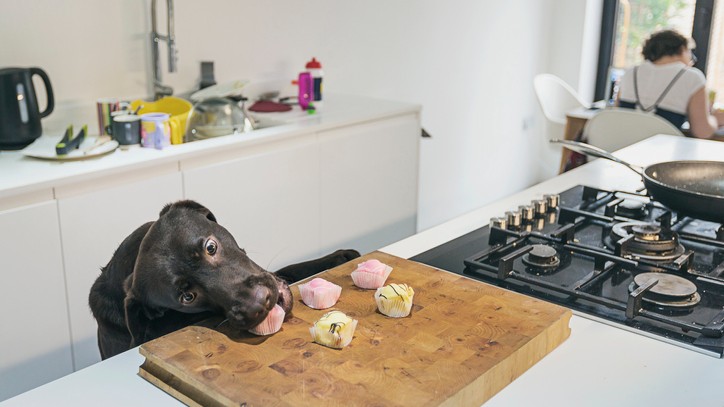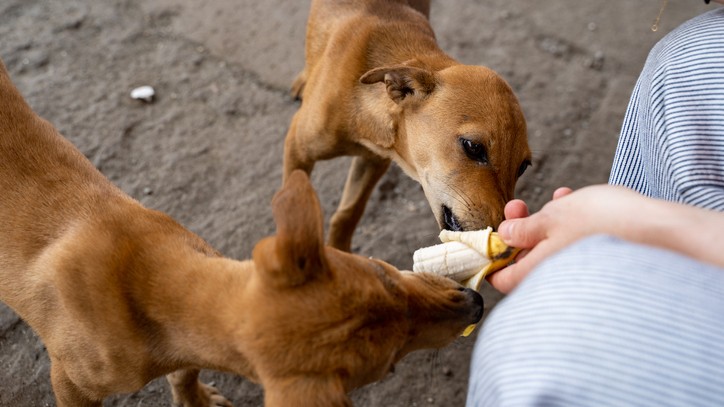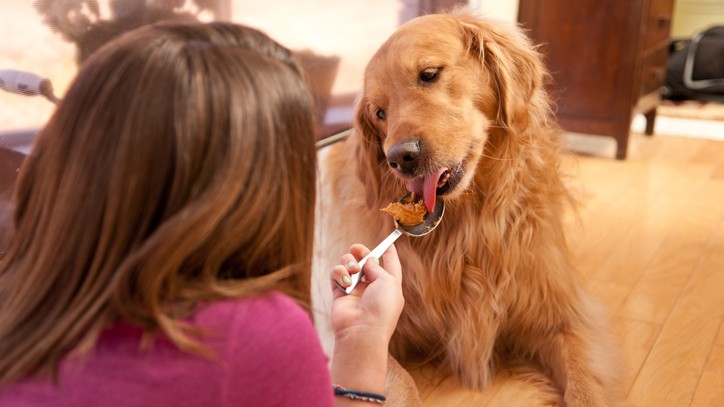What human food can dogs eat? How to safely give your dog a little treat
What human food can dogs eat? Here’s 12 foods your can share with your pooch – and a few to avoid

Get the best advice, tips and top tech for your beloved Pets
You are now subscribed
Your newsletter sign-up was successful
If you’ve got a dog, they're like any other part of the family - you love them dearly, and you want to show them. So, as you're munching away on something tasty, you might wonder, "what human food can dogs eat?"
Sharing our food with our dogs is one of the ways we show our love for them and spoil them, along with a keeping good supply of the best dog treats. It’s perfectly okay to do this as an occasional treat, as long as you follow three rules. One: you should only feed things that you know are safe; two: you should always introduce new foods very gradually; and three, you should keep a close eye on their calorie intake.
We’re going to give you the top 12 foods you can share with your dog, as well as some advice on how to feed them human food safely. If you want to find out about doggy-specific dinners, try our guide to the best dry dog food for the best brands and deals or check out our guide to what spices can dogs eat for safe ways to add more nutrients and flavor to your dog's meals.
How to introduce a new human food to your dog
Safe ‘human foods’ for dogs can be good to include as occasional treats and little extras in their diet. Trying new flavors and textures is great for enrichment, and some types of food can keep them entertained for hours. But every dog is different – and what is good for one dog might not be so good for the next. When trying new food with your dog, start by giving them a small amount first – no bigger than your thumbnail - and see what they think of it. Let them explore it and decide if they want to eat it. If they do, observe them for 48 hours to check that they don't have any adverse reactions. Once you're sure that everything is okay, you can continue feeding your dog this human food. However, you should keep a close eye, especially if you begin to feed them more significant amounts.
How to work out how many treats your dog is allowed
It’s important to remember that your human food is not part of your dog’s balanced diet. Their usual dog food contains all the vitamins and minerals they need- and it’s possible to ‘unbalance’ it by adding too many extras. Human foods should be considered as a treat, supplement, or topper. Nutritionists recommend that you don’t feed more than 10% of your dog’s daily calorie allowance in treats so as not to unbalance your dog’s diet. This calorie calculator for dogs tells you your dog's calorie allowance and treat allocation. You can look up the calorie content of most human foods on nutrition websites, but we've included the calories for the foods that dogs can eat in this list for ease.
Human foods dogs can eat safely
Carrots are a brilliant treat to share with your dog. They're full of vitamins, including vitamin E, A, and C. They're also high in the antioxidant beta-carotene and contain plenty of fiber, which is vital for gut health. Carrots are so safe that vets regularly recommend them. These low-calorie, high-fiber treats fill your dog up, satisfy their chewing requirements, and even help their anal glands. Another added benefit is that chewing on carrots can help remove plaque and bacteria from their teeth, reducing their risk of dental disease. The only downside is that carrots can be a choking risk- supervise your dog at all times and cut the pieces up small enough to avoid choking. Carrots can be fed raw or cooked, and a small (30g) carrot contains around 15 calories.
Broccoli?
Broccoli is safe for dogs to eat. In fact, it contains a range of healthy vitamins that are good for your pet, as well as being low in fat and calories. Vitamin K1 is needed for blood clotting and is found in high levels in broccoli, making it an excellent choice for greyhounds and other dogs prone to bleeding. Broccoli can be fed to dogs either cooked or raw and contains just 20 calories per 60g raw.
Get the best advice, tips and top tech for your beloved Pets
Banana
Great news – bananas are safe to share with your dogs! They’re great for humans because they’re high in potassium, fiber, and energy. Dogs share these banana benefits, with the added bonus that their texture means they’re great for stuffing into puzzle toys! Watch out, though – all that energy means that bananas are high in calories and can quickly use up your dog’s calorie allowance if given daily. Half a kid’s size banana is around 30 calories, so you should aim only to give some occasionally.

Blueberries
You can safely share blueberries with your dog – if you have any to spare, that is! Blueberries are safe for dogs to eat and contain vital nutrients. Some vets recommend them as a healthy addition to the diet for very active dogs due to their antioxidant profile. They're also being investigated to check whether they could prevent doggy dementia. Perhaps adding a few to your elderly dog's diet might be a good idea to keep their brain functioning well. A tablespoon of blueberries contains just 8 calories.
Pineapple
Thankfully, pineapple is considered safe for dogs to eat – although not all dogs will like it. It used to be recommended as a cure for coprophagia, which is when a dog eats their stools, but there's no proof that it works. As a healthy snack, though, it works wonders. Remember to start small, as your dog may turn their nose up at pineapple due to the strong smell. Pineapple contains about 10kcal in 20g.
Oranges
If your dog likes oranges, the great news is that they can eat them safely. However, many dogs won’t like the taste. Oranges are high in sugar, but they’re also high in fiber, which prevents a huge blood sugar rise. The combination of antioxidants found in oranges is thought to slow down ageing in dogs’ brains, so they’re the perfect human food snack for a senior pup. Oranges contain around 10kcal in 30g, which is about the right amount for a 20lb dog.
Coconut
Coconut can be safely shared with dogs, as long as it's given in small amounts - an occasional nibble is fine. Coconut is safe and non-toxic, but it does contain high amounts of fat. This means that large amounts can cause gastric upset and even pancreatitis, as well as obesity. It’s also a choking hazard, so make sure you give only small pieces and supervise your dog closely. If you do decide to share a small piece of coconut with your dog, make sure it's fresh coconut, and make it a very occasional treat – 10g contains 35 calories, so it isn't something to give too often!
Here’s some more info about coconut oil for dogs.
Peanut butter
Peanut butter is another human food that’s safe to share with your dog. Although not particularly healthy, it’s regularly recommended by vets and behaviorists as a great filler for puzzle toys and bone-replacing chews. It can also help get certain medications into your dog if they struggle with tablets! Dogs can have chunky or smooth peanut butter, provided it hasn't got Xylitol (aka E 967) as a low-sugar alternative. At 91 kcal per tablespoon, peanut butter is high in fat and calories. You should therefore make sure only to give a little.

Celery
Celery is another healthy human food for dogs! Celery doesn't contain many calories, which means it's a good treat for overweight dogs - if they like it, of course! It's also under investigation for whether it can help dogs cope with their chemotherapy - so watch this space! Just make sure to cut it up small enough that there's no risk of choking. Half of a medium-sized stalk of celery contains just 3 calories, so there’s no risk of celery causing obesity!
Sweetcorn
This one comes with a proviso. Yes, dogs can eat sweetcorn - but they must never, ever eat the cob. Sweetcorn cobs cause severe damage to the gut and usually get stuck, needing surgical removal. On the other hand, the kernels are fine, including tinned sweetcorn in spring water. But you should be aware there are no known nutritional benefits to dogs as the kernels are hard to digest - they'll mostly appear in your dog's poop. A tablespoon of sweetcorn kernels contains around 30 calories.
Prawns/shrimp
Most dogs love to snack on shrimp. They'll need to be cooked and peeled, just as you would for yourself. Start with a tiny amount and observe closely, as there have been a couple of reports of allergic dogs. But most dogs find prawns to be a healthy addition that is high in Omega-3 and Omega-6 fatty acids, making them great for dogs with poor skin or coats. Prawns are very low in calories, with 100g containing just 115 calories.
Strawberries
Strawberries are safe for dogs, and most dogs like their sweet taste. If your dog seems to enjoy eating strawberries, try chopping one over his meal or sharing one to give them a boost of vitamin C. A single medium-sized strawberry contains around 5kcal.
Human foods you should never share with your dog
For safety, it’s best to only feed your dog with human food you already know is safe. However, sometimes somebody else might feed your dog, or your hungry hound might help themselves to something in the kitchen, in which case it's helpful to know which human foods dogs should never eat. While this list contains many common human foods that are toxic to dogs, it’s not exhaustive.
Luckily, it's becoming common knowledge that chocolate is poisonous to dogs. Still, there are plenty of other human foods that your dog shouldn't eat. Grapes, sultanas, and raisins are now known to be toxic to dogs. While it's not yet known why, some dogs have suffered severe kidney failure after just a couple of raisins or grapes, even if they’ve been home-grown. Coffee should never be fed to dogs, as they cannot process caffeine in the same way we do.
Onions, garlic, chives, and other members of the allium family are also toxic to dogs. While most dogs won't show symptoms immediately, alliums damage the red blood cells, causing anaemia. The anaemia prevents them from carrying oxygen in their blood, so they are often very ill after a few days. Macadamia nuts and walnuts also cause severe symptoms in dogs. However, all nuts can potentially be dangerous, thanks to their high fat content and choking risk.
Lastly, while not toxic, some foods are still not recommended to feed to your dog. Milk and other dairy products are complicated – while all dogs are lactose-intolerant, most will cope with a minimal amount of dairy in their diet. Cheese is often used as a training treat, and in tiny cubes appears to be okay, as long as not too much is given, but don't forget that it's very, very fattening. On the other hand, ice cream contains far too much sugar and fat – it's likely to cause obesity or even pancreatitis and isn’t recommended.
In other words, there’s a whole range of things that are thought to be dangerous to dogs, including drinks, nuts, fruits, and vegetables – far more than are included in this list. So, instead of just avoiding the things in this list, it’s a much better idea to only feed something if you know, for a fact, that it’s dog-safe.
Feeding human foods to your dog
Feeding new and different things to your dog is great for their brain, their nutrition, and your relationship. Just make sure that you only provide foods you are certain are safe. It’s also important to only feed them human food in tiny amounts and ensure that the extra calories don’t make your dog put on weight. Now that you have more information, you can enjoy giving your dog some safe human foods to try without worry.
If you’re questioning, ‘Can dogs eat cabbage?’, have a read of this expert’s guide. Or can dogs have fish skins?
After graduating as a vet from the University of Nottingham in 2016, Dr. Joanna Woodnutt went on to practice companion animal medicine in the Midlands. She quickly developed a love of consulting and helping clients with medical problems such as dermatology, behavior and nutrition - anything that involved helping clients understand their pets better.
Jo started writing about pet health in 2017, realizing that it meant she could help even more pet parents. Since then, she has written for countless online and print publications and is a regular contributor for Edition Dog Magazine. Jo is the director of The Veterinary Content Company, which she founded in 2020. She is also the founder of Petlearnia, a platform that provides pet e-learning courses for pet parents.
Jo now lives in the Channel Islands with her husband Ian and terrier Pixie.

